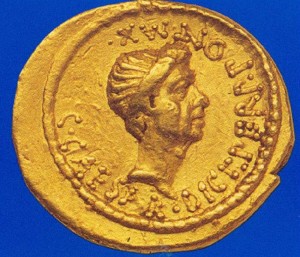 Julius Caesar initiated a favourable attitude towards the Jews, and was much admired in rabbinic literature. Caesar’s enmity towards Pompey (e.g. the Great), who had conquered Jerusalem and defiled the Holy of Holies, increased his popularity among the Jews.
Julius Caesar initiated a favourable attitude towards the Jews, and was much admired in rabbinic literature. Caesar’s enmity towards Pompey (e.g. the Great), who had conquered Jerusalem and defiled the Holy of Holies, increased his popularity among the Jews.
He arranged for the Roman Senate to exempt synagogues from a general ban on freedom of worship and to release Jews from compulsory military service, allowed Jews to judge cases amongst themselves in accordance with their own law, and granted autonomy to the Jewish communities in Phoenicia and Asia Minor.
Caesar attempted to rectify some of Pompey’s measures against the Jews. He instituted a new administration in Judaea, permitted the reconstruction of the walls of Jerusalem, restored the port of Jaffa to Judaean control and confirmed Hyrcanus and his descendants as high priests and ethnarchs of Judaea. The annual taxation of Judaea was set at 12.5% of the land’s produce, excluding the sabbatical year (e.g. Schmita), and extortion by the military forces was forbidden. No wonder, then, that groups of Jews came to weep at the site of Caesar’s funeral pyre after his murder, as recorded by the historian Suetonius.
Caesar’s measures were followed over the next eighty years by a series of similar decrees issued by other Roman leaders, beginning with an announcement issued to all the Roman officials in Asia in 44 – 43 B.C.E. These documents enjoin the Greek cities to guarantee their Jews exemption from military service, permission to observe the Sabbath and use their sacred books, freedom to hold religious meetings, freedom to send contributions to the Jerusalem Temple, and the right to settle their internal controversies.